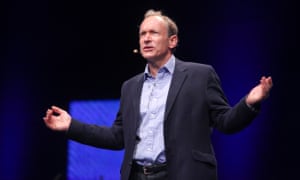Weekly New/Digital Media (53)
Tim Berners-Lee calls for tighter regulation of online political advertising
Summary: "Inventor of the worldwide web described in an open letter how it has become a sophisticated and targeted industry, drawing on huge pools of personal data"
He wrote his open letter expressing the unethical nature of 'internet blind spot(s)' in regards to political campaigning on the internet becoming an almost 'targeted and sophisticated industry' especially due to the targeted political ads online. Unethical due to the fact that voters are sometimes pointed towards fake news sites that can discourage them to vote. All due to a lack of regulation and the loss of control over our own personal data and spread of misinformation online. This also allows the government to track our behavior much more easily, more so in repressive government settings.
Key facts/ statistics:
- Sir Tim Berners-Lee, the inventor of the worldwide web, has called for tighter regulation of online political advertising, which he says is being used in “unethical ways”.
- “We urgently need to close the ‘internet blind spot’ in the regulation of political campaigning,” he said, writing in an open letter marking the 28th anniversary of his invention.
- political advertising has become a sophisticated and targeted industry, drawing on enormous pools of personal data on Facebook and Google.
- This means that campaigns create personalised ads for individuals – as many as 50,000 variations each day on Facebook during the 2016 US election, he said.
- “Targeted advertising allows a campaign to say completely different, possibly conflicting things to different groups. Is that democratic?” Berners-Lee said.
- Personal data is the price many of us agree to pay for free services online, but Berners-Lee points out that “we’re missing a trick” by letting large data-harvesting companies – such as Google, Facebook and Amazon – control that information.
- “As our data is then held in proprietary silos, out of sight to us, we lose out on the benefits we could realise if we had direct control over this data, and chose when and with whom to share it,” he said.
- Berners-Lee’s final concern was that it is too easy for misinformation to spread on the web, particularly as there has been a huge consolidation in the way people find news and information online through gatekeepers like Facebook and Google, who select content to show us based on algorithms that learn from the harvesting of personal data.
- “The net result is that these sites show us content they think we’ll click on – meaning that misinformation, or fake news, which is surprising, shocking, or designed to appeal to our biases can spread like wildfire,”
- This allows for people with bad intentions and “armies of bots” to game the system to spread misinformation for financial or political gain.
- “It has taken all of us to build the web we have, and now it is up to all of us to build the web we want – for everyone.”
My opinion:
It seems that the sheer power we give to media organisations is becoming more apparent today, as they seem to be finding more and more ways to montise that data and exploit the users. This almost seems another rise of a marxist society as we are more willing to give over our personal data, privacy, independence in order to receive 'free services' being duped into the status quo very willingly as we don't recognize the sheer amount of power we are giving these organisations over us, an almost rise of the hypodermic needle model because this time we are being controlled in a more targeted individual manner as the appeal to each of our independent thoughts and desires through the data they have received, and control us through that. So instead of controlling the mass in one way, they have found more methods making it way more effective than it was in the past. Even through this article, we may realize that this is happening but there isn't much we can do about it, they seem to know that.
Comments
Post a Comment